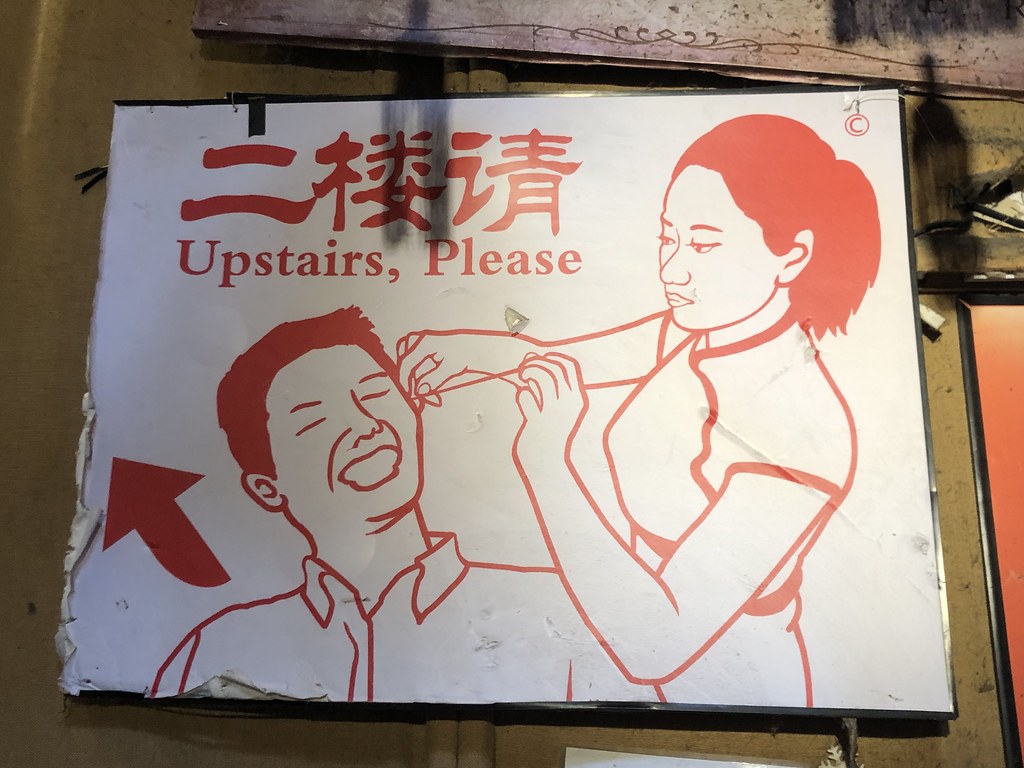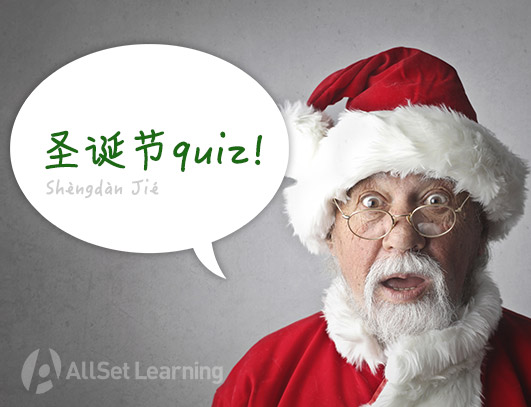07
Apr 2022Shanghai Lockdown so far (April 2022)
By now it’s not news that all of Shanghai is back in lockdown. It started for me on April 1st, and there’s no end in sight. SupChina gives a good rundown of the situation, and this old Shanghainese man’s perspective is definitely worth a read. (Fortunately the issue with parents and children being separated has already been resolved a few days ago.)

So now that the “news” is out of the way, I’ll just share a bit about how 2022 is different from 2020.
- In 2020 we never feared running out of food. There were shortages (toilet paper, anyone?), but the deliveries never stopped.
- In 2020 we could still go out, but we mostly chose not to. That’s because…
- In 2020 we were actually afraid of the virus. We felt there was a chance it could kill us or someone we love. In 2022, no one is actually afraid of getting sick anymore.
- In 2022 we are afraid of getting put on lockdown (which has now already happened), or worse, testing positive and getting separated from our families and sent off to an isolation center who knows where.
- In 2020 we could still take our dogs out to relieve themselves.
- In 2020 there was no testing (for most of the year?), but now it’s just happening all the time, over and over
- In 2020 there was fear, but energy was high. In 2022 we’re just so COVID-weary…
- In 2020 there was confidence and pride in the government’s ability to properly deal with the situation while the rest of the world floundered. In 2022 that confidence and pride still exists, but it’s quickly eroding and getting worse every day.
And now just a few tidbits about daily life under lockdown:
- I’ve heard stories (and seen videos) of people running out of food. I personally don’t know anyone who has run out of food, but we’re all living under the constant “background” fear of running out. We’re checking all of the food delivery sites every day to see if any are accepting orders again or can finally deliver the food we ordered days ago. When the government provides a free bag of food (it’s happened to me once so far), we gleefully accept it and take a picture of exactly what we got, which we then share with all of our friends on WeChat.
- Deliveries in many communities have stopped, simply because they’re no longer allowed to deliver to our doors or even our buildings, and it’s too much work for the building management to be constantly running piles of packages to every building. Only emergency packages or food get priority.
- The kids continue with online schooling, of course. My kids are fine. In fact, my son (7yo) voluntarily washed his own dishes for the first time ever after breakfast today. (Win!)
- Everyone is working from home, of course, but it’s hard for parents, with the kids in the house and the constant anxiety over COVID. We find ourselves checking 10 different WeChat groups every 10 minutes to see if there’s any news, if policies are changing, if anyone we know has tested positive, if any food deliveries will be resuming soon, if there are any new videos or memes, etc. etc. It’s hell on productivity, I can tell you!
- One positive side effect is that we’ve all been thrown into WeChat groups with our neighbors, and are now actually communicating with them for the first time (albeit over WeChat)! Relations with neighbors in modern Shanghai are notoriously distant in most apartment buildings… it’s normal to not know or ever even talk to your next-door neighbor. And now the dog owners in our complex have a group, and each building has a group… we commiserate, we share info, we notify each other when the latest test results are out, and we even go in one “group buy” food purchases. This part is pretty cool.
- BUT, even while under lockdown for so many days (this is day 7 for me), new positive cases are popping up (but nearly all without symptoms). There was one in my building. It’s mystifying and frustrating. The contagiousness of the omicron strain is just more powerful than all of these drastic measures being taken. That’s the most frustrating part… to see the same thing tried over and over again, expecting a different results. The refrain that we see again and again is, “using 2020 measures for the different 2022 situation.”
We’ll get through this. We’re not being ravaged by war, most of us are not actually getting sick. So we’re trying to count our blessings.
22
Mar 2022Mysterious Hand-written Character
This is definitely not a post for beginners. If you’re an advanced learner or literate native speaker of Chinese and take an interest in character variants, you might enjoy this, though.
Take a look at this Chinese character, hand-written for a sign in my Shanghai office:
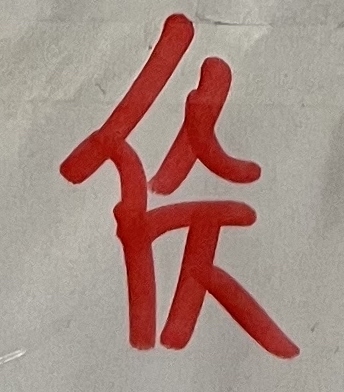
You’re likely having trouble deciphering that. On first glance, it looked to me like a person component on the left (亻), with two vertically-stacked 人 on the right, a 一 in between them. In fact, the bottom half almost looked like a Korean ㅈ to me. But no, this is Chinese, written by a native speaker/writer of Chinese, and intended for other Chinese people.
Here’s the character as part of a two-character word in context:
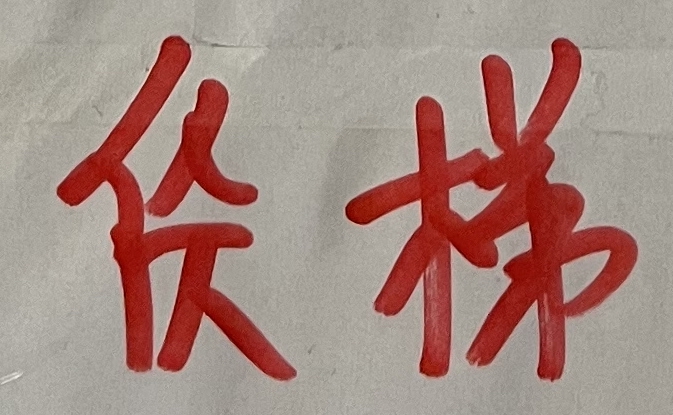
Easier to read now?
If you still can’t get it and your Chinese is sufficiently advanced, the rest of the context should make it clear enough:
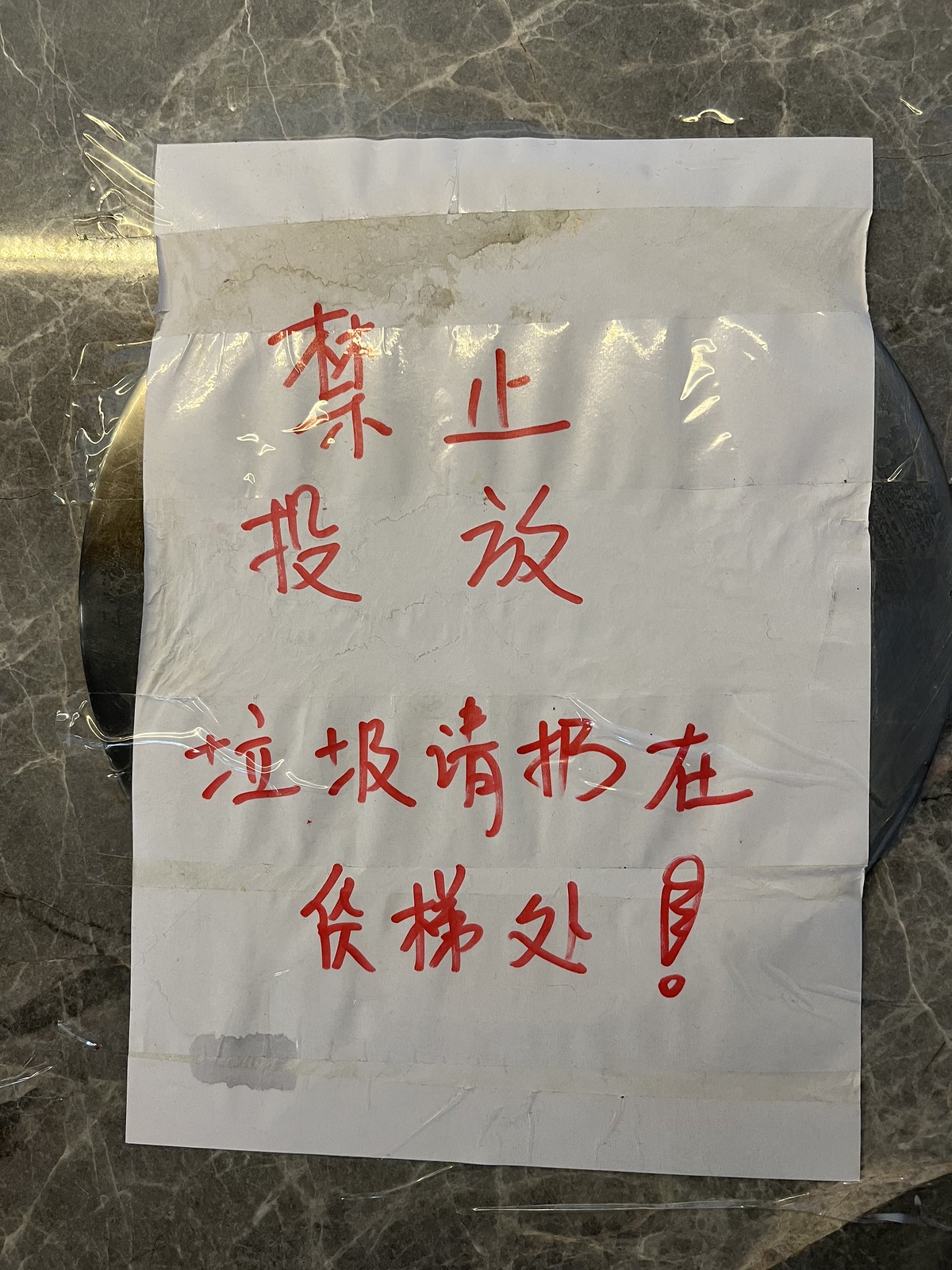
The notice reads:
禁止
投放
垃圾请扔在
货梯处!
So the mystery character here is 货 (huò), as in the word 货梯 (huò tī), or freight elevator.
Does this answer seem wrong to you? It felt wrong to me. I asked some native speakers if they could read it, showing them first the isolated character, then the full context. In every case, they couldn’t read it in isolation, but could read it in context, and while admitting it looked weird, didn’t agree that it was wrong… just sloppy.
OK, but now that we know that the character is supposed to be 货 (huò), we can make a bit more sense of it.

So here’s my analysis:
- First of all, what I originally thought was a 亻 down the left side is actually confined to the top half in a stubby 亻, the bottom of which overlaps with the form beneath it.
- The top of this character should be 化, but the right side is definitely 人 rather than 匕. I’m not sure how anyone could argue otherwise. I see this as mistake #1.
- The bottom part should be 贝, but there’s a stroke missing. I see a 厂 with a 人 inside it (仄). Not sure how you can say there’s not a stroke clearly missing on the right side. I see this is mistake #2.
Given these two clear mistakes (?), I’m not sure why native speakers don’t feel like this character is blatantly wrong, like I do. (If it’s worth anything, my fourth grader, a life-long student of the Chinese school system, couldn’t get how that could be 货 either.) But hey, differences in perception are a big part of what makes this whole language-learning adventure fun.
And, good thing actual hand-to-paper writing is becoming a thing of the past, right??
(But in all seriousness, I do welcome additional analysis!)
P.S. This is a good example where being familiar with the structural patterns of Chinese characters is useful. What I originally assumed to be ⿰ (with a ⿱ embedded on the right side) was actually ⿱. Greater familiarity with different structures gives your mind greater flexibility in character recognition.
16
Mar 2022Back to Online Schooling (COVID in Shanghai, 2022)
Starting this week, all kindergartners, primary schoolers, and middle schoolers in Shanghai have been ordered to stay home and do online lessons again (like back in 2020). This is while all kinds of apartment complexes and other buildings are going into lockdown and the city authorities scramble to regain control of the situation. Staying “COVID zero” under omicron is not so easy!
Back to Online Lessons for Kids
I think it goes without saying that having kids do lessons online is hard for parents. Our school’s schedule is 20 minutes of video lecture followed by 20 minutes of online chatroom interaction, followed by 20 minutes of rest or some homework time. Then repeat. There’s a two-hour break for lunch. While I applaud the school’s fairly realistic expectations for the kids’ attention spans, this schedule absolutely requires a parent’s constant supervision. Parents “working from home” aren’t getting much work done. (I know, this is nothing new to parents in any country who went through the online schooling thing last year and/or in 2020.)
My wife’s comment was, “and they want Chinese households to have three kids? We can barely manage two kids’ studies. Managing these kids’ studies is practically a full-time job.”
Here’s a (not-so-subtly snapped) picture of how one local baozi shop owner is dealing with the situation:
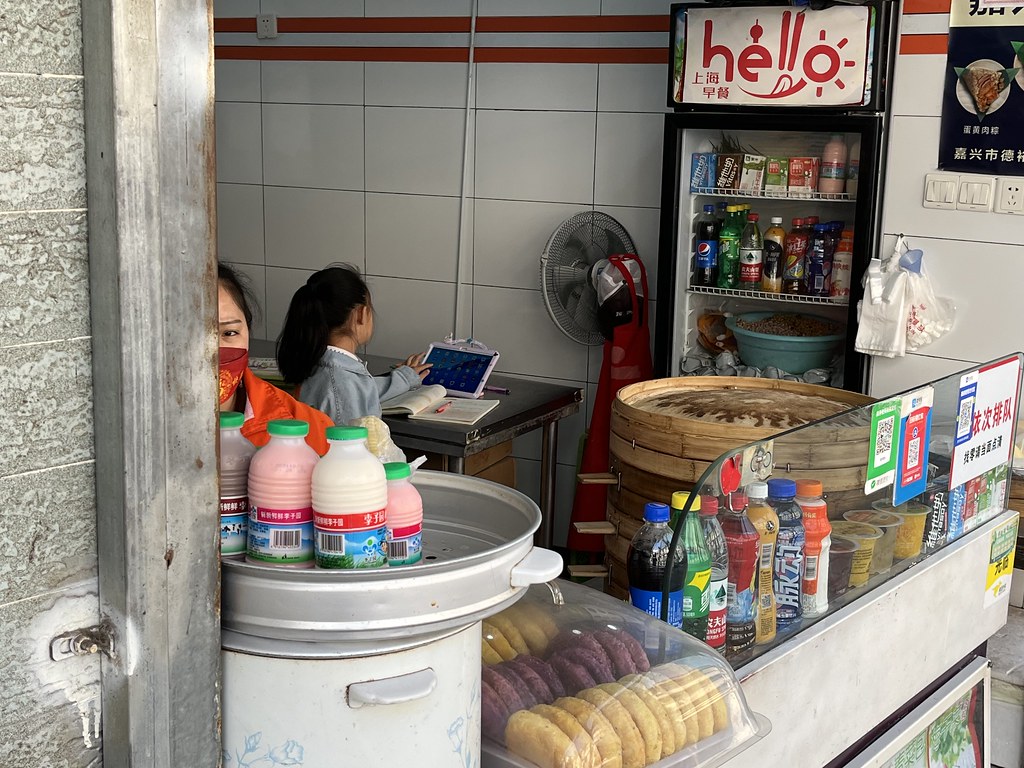
The (Brief?) Silver Lining
There is, however, a silver lining that it’s both nice and a little depressing to see. In China, most families live in big apartment complexes. You might think that this means that there are always lots of other kids in the same complex to play with. While there are definitely lots of other kids in almost any complex, under normal circumstances those kids have so much homework and so many extra-curricular activities that they rarely just “play outside” and very rarely play with the neighbor kids. But now that it’s spring, all of the kids are on the same online schooling schedule, and all extra-curriculars are forbidden I’m seeing the neighbor kids all outside playing together for… well, probably the first time ever. And I’m hearing other parents say the same thing about the kids in their own apartment complexes.
And now… Coffee!
Finally, I have randomly chosen these past few weeks to start trying Manner Coffee, an up-and-coming coffee brand in Shanghai. It’s really good! I’m a big fan of the “apple pie” latte (Oatly milk, a little coconut flavor, a little apple flavor, and some cinnamon).
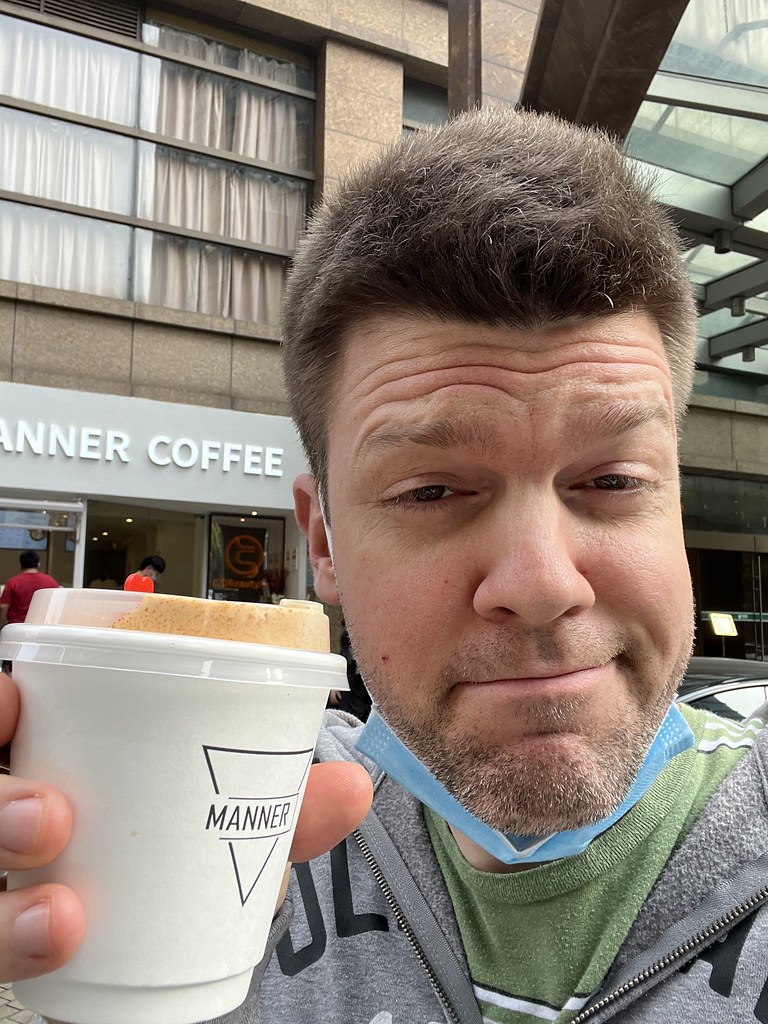
10
Mar 2022Accosted on the Street in Shanghai
Aside from COVID updates, I don’t write a lot about daily life in Shanghai these days. After living in China 20+ years, there’s not a lot that feels worth mentioning. Recently, though, I had a very new experience.
The Incident
I was walking down the sidewalk one morning, heading to the office. You can see from this picture what a normal stretch of sidewalk it was:

I was walking “toward the camera” (like the two people in the foreground of the photo above). I was about where the woman in the tan jacket is.
Then I noticed a woman (around 40?) walking toward me on the sidewalk lock eyes with me. She looked unhappy. I had no idea who she was or why she might be upset with me.
When I got close to her, she planted herself right in front of me and told me (in English) that I wasn’t allowed to walk in that direction on the sidewalk. I was confused. This was a sidewalk I’d literally been walking back and forth on for years. Right next to me on the sidewalk were other pedestrians walking the same way. I tried to just walk around her, but she quickly moved to block me and even grabbed hold of my jacket. She refused to let me pass.
As I kept trying to go around her, she got angrier and angrier at my “insolence.” She insisted that I was walking the wrong way on the sidewalk, and that I had to walk the other way to the intersection a block down, cross the street, and walk on the other side of the street. Not only was this a ridiculous 10-minute detour, but it’s just blatantly untrue. This was not a one-way sidewalk, and even if the woman was somehow right, she was also just ignoring everyone else who was walking the “wrong” on the same stretch of sidewalk. People on bikes and scooters too.
As the woman started shouting at me that foreigners can’t just do as they please in Shanghai, a crowd was gathering. Mostly delivery guys and elderly local residents. Fortunately, since we were now speaking in Chinese, everyone could understand what was going on. Some of the elderly Shanghainese bystanders started to interject.
“Of course he’s allowed to walk that way. It’s a sidewalk.”
“What are you talking about? Let him go.”
And to me, quietly, “there’s something not right in her head.”
“Mind your own business!” the woman snapped at them.
As the incident dragged on, a kindly old man called the police for me. I had started recording everything on my phone shortly after the altercation started, for my own protection. (This angered her at first, but then she ignored it.) I wasn’t about to push the woman or lay a hand on her in any way, but who knew what story would be told later. So I needed video proof.
As the minutes dragged on, the police didn’t show up, and one of the bystanders, an old Shanghainese man, started arguing with her. It turned into a shouting match and, unfortunately, got a bit physical between the two of them. No one was hurt, but the end result was that the woman stormed off, shouting obscenities at the old man.
I was free.
The old folk assured me that I had done nothing wrong, and that she wasn’t right in the head.
It had wasted about 15 minutes of my day, and left me unsettled.
A Few Thoughts
- Mental health is a tricky issue that is often avoided in China. It’s traditionally viewed as a personal, family matter, and there’s shame associated with seeking help. I do see the situation getting better, but it’s slow going. No one knows how to react to public incidents like this. I do wonder what the police would have done, had they showed up.
- I do have a video of the incident, but I see no reason to share it.
- What if it wasn’t a matter of “walking the wrong way on the sidewalk,” but riding a bike or a scooter the wrong way on the street? This does happen… You see people riding the wrong direction in the bike lane all the time. It’s illegal, and it’s dangerous, but people do it. If a foreigner were to get called out for doing that (despite other locals around doing the same thing), a doubt the foreigner would get any sympathy from bystanders. Very different situation, legally, but also similar.
- The locals totally supported me. It’s key here that they could understand what was being said. If our conversation had stayed in English, they might have made some incorrect assumptions and sided with the woman, without really knowing what had happened.
- The woman herself was not from Shanghai, and she even proudly declared that she had just arrived from Beijing. A coworker of mine declared that this proclamation negated any sympathy she might have gotten from the local bystanders. I’m not sure.
Stay safe, everyone. And stay calm!
03
Mar 20223D Chinese Characters in Shanghai
I was interested to stumble across these weird 3D Chinese character benches (?) on a walk through Shanghai the other day:

They read:
小红书
街角趣动场
So 小红书 (Xiǎohóngshū) is a social media network, and this is some kind of promotional exercise area they’ve sponsored, which they call 街角趣动场 (Jiējiǎo Qù Dòng Chǎng). 街角 (jiējiǎo) refers to a street corner, and 趣动场 (Qù Dòng Chǎng) appears to be a word they’ve created on their own.
If you’re interested, it’s here:

And yeah, it’s also got these Super Mario question mark boxes, which is weird, but cool, I guess?

23
Feb 2022The Weirdest Pinyin Ever
Check out the name of this clothing shop in Shanghai:

It just looks so wrong, but it’s actually correct, if you ignore the fact that the N (И) and D (ᗡ) are written backwards. It still kinda hurts my brain, though.
Also, the characters 單農 (DĀN NÓNG) are written in traditional characters. In simplified, they are 单农.
As for what “單農” as a name is supposed to actually mean, I have no idea. Any theories?
16
Feb 2022Cyber Coffee and Alpacas in Shanghai
This past Saturday I was walking around in downtown Shanghai and passed this interesting-looking “Cyber Coffee” cafe:

For some reason that got me thinking about the night I went out with some friends and we randomly encountered a downtown bar with a real live alpaca inside. (Yes, it was one of those Shanghai nights…) We had a nice selfie moment.
But I couldn’t remember where that particular bar was, so I asked the friend. His response led me to use a photo’s EXIF location data for probably my most noteworthy application ever:

Now I just gotta find out what the alpaca’s schedule is.
08
Feb 2022It’s Official: Masks Disguise Weight Gain
Saw this one on the street in Shanghai over the Chinese New Year holiday:

It reads:
只要口罩戴得好 (Zhǐyào kǒuzhào dài de hǎo)
就没人知道 (jiù méi rén zhīdao)
你今年胖了多少斤 (nǐ jīnnián pàng le duōshao jīn)
And in English:
As long as you wear your mask right,
No one is going to know
How much weight you’ve gained this year
Not the most hilarious joke, but it was interesting to see government propaganda with a sense of humor.
(Also, you’re not really gaining too much weight if it can all be hidden be a face mask!)
28
Jan 2022Thoughts on Chinese New Year (2022)
There’s been lots of talk about Chinese New Year (CNY) here in the office all week, and a rush to get everything done for the big holiday. It’s the time of year when foreigners’ work visas are furiously getting renewed (hopefully!), and when out-of-towners leave Shanghai for a long visit home.
COVID has wreaked havoc on people’s lives when it comes to traveling cross country, but this year, after two years of COVID-affected Chinese New Years, there seems to be a much stronger push to get home among the Chinese people I know. I can certainly understand that… it’s been way too long since I’ve visited my own family back in the US.
But speaking of changes in attitudes to CNY, I’ve also taken a look at some of my older posts, such as my infamous 10 Reasons I Hate Chinese New Year from 2007. I barely recognize the sentiments expressed in that blog post, namely because:
- Shanghai has gotten much stricter about fireworks within the city center, so it’s no longer so noisy and dangerous.
- I’ve made peace with bajiu culture, and while I rarely drink it, I do drink it on occasions like Chinese New Year, mostly just to make my father-in-law happy.
- The Chunwan (春晚) craptacular is no longer such a big deal… I think a lot of people relegate it to “background noise” on CNY Eve, and/or just wait until the next day for highlights on social media.
- The mass migration called 春运 doesn’t seem so impossible anymore… it’s more of a nuisance than a near-insurmountable obstacle. Perhaps COVID has put things in perspective?
Yeah, Shanghai still feels a bit melancholy at this time of year. But those of us with kids can’t really travel. And so my family, at least, is heading to the countryside outside Shanghai to hole up in a little cottage on a lake to soak up some nature, enjoy each other’s company, and even set off a few fireworks.

It’s almost like the whole thing has come full circle, finally, and I’m going to enjoy Chinese New Year for real this year.
(Not the baijiu, though. Never the baijiu.)
19
Jan 2022Chinese New Year Guilt Sells
I saw this ad in an elevator here in Shanghai:

Here’s a transcript of the Chinese text:
担心的不是
过年回不了家
而是回家发现
对爸妈的关心还没够
And here’s an English translation:
What you’re worried about
isn’t not being able to get home for CNY
but rather getting home only to find
you haven’t done enough for your parents.
Oh man… SO CHINESE! We’ve got these elements:
- Chinese New Year (CNY)
- not being able to make it home for CNY (sometimes an issue even before COVID)
- guilt over filial obligations
When I shared this ad with some Chinese friends, they agreed with my assessment of the ad and its “emotionally predatory” nature. But then they also added: 脑白金 (Naobaijin) is still the undisputed king of supplements that brainwash with their ads.
I remember seeing Naobaijin ads when I first came to China in 2000. Rather than blatantly focusing on guilt, they have just relentlessly continued an ad campaign over many years that focuses on a single message: give this product to old people you care about. The price point is such that it’s not a cheap gift, but still affordable for most people. And if you buy a similar product from a less expensive competitor, you just look cheap. But no one will fault you for giving Naobaijin to old people as a gift, because it has secured its position in the minds of the populace.
As for Caltrate… will guilt tactics work? Who knows…
14
Jan 2022Weird Week in Shanghai (more COVID)
Strangely stressful week in Shanghai… There have just been so many COVID cases popping up, and second-hand reports of buildings being put into lockdown. Here’s one example from yesterday (via Twitter):
A personal connection is that our family ayi can’t come to work today because the building she lives in is suddenly on lockdown. A mall in Shanghai called Global Harbor got put on lockdown yesterday, but someone in there insisted on leaving and going home, which put everyone in their building in lockdown today. (I didn’t think you could simply “insist on leaving lockdown,” but I’m guessing there’s more story there which we simply don’t know.)
Our ayi says that they can’t leave their building, but a notice with a QR code has been posted. They can scan it to pay 460 RMB for a nucleic acid test. Understandably, most of the residents don’t want to do that. (That’s kind of expensive.) So they’re just stuck waiting.
It’s a really weird feeling, how all of this stuff just comes through the grapevine (mostly on WeChat), because a lot of it isn’t officially reported. Different people have wildly different opinions on whether this is all “no big deal” (just a series of minor nuisances), or whether there’s some big scary situation (or at least super inconvenient situation) gradually developing.
My kids were also ordered to stay home from school today. Fortunately the semester is already essentially over anyway.
So life remains pretty normal, while at the same time being COVID-surreal. We’re all very curious to know how much longer this COVID-zero policy is going to continue.
06
Jan 2022Life with Kids in the Time of COVID
As China’s COVID-zero policy drags on and on, a certain dichotomy has emerged in the population here: those without kids can still travel within China, as long as they’re aware of the “high risk regions” and plan for some extra mafan in the form of COVID testing, quarantining, etc. A lot of foreigners I know went to Sanya for their Christmas/New Year holiday. Meanwhile, those with kids (in non-international schools) are very much subject to their schools’ regulations, which essentially means not going anywhere.
So yeah, that’s me… stuck in Shanghai for the foreseeable future. My family went to Guilin and Yangshuo over the summer (when there was plenty of time for self-quarantining after travel). Travel over the Chinese New Year (CNY) vacation is possible, since kids have about 4 weeks off of school, and in non-COVID times Shanghainese families are normally quite fond of traveling during CNY rather than spending the whole vacation in Shanghai with family. But with a shorter timeframe and fewer appealing choices, it’s harder to arrange. Plus new cases (and resulting COVID crackdowns) are much more likely to emerge in the winter.
These days around Shanghai mask enforcement is quite spotty. Although many places require a mask for entry (like a mall), most won’t actually enforce the rule once you get inside. Most restaurants seem to have stopped enforcing masks altogether. Public transport and hospitals still require everyone to keep masks on at all times, of course.
As for the “health QR code” on our phones, it’s required to get into pretty much any public building, including malls and some restaurants. For a while I was getting away with using screenshots of my health code (it can take up to a minute to load the stupid code sometimes), but the app added the current time (including constantly updating seconds) to the QR code display as a countermeasure. Most of the guards at the door checking QR codes aren’t scrutinizing the phone screens they check all day long, but everyone is getting used to habitually showing a health code to get into a building. (Those QR codes are virtually never actually scanned.)
Scrolling through my photos of the past few months, I see remarkably few masked faces. It’s a strange routine we’ve settled into: only momentary mask-wearing (plus on public transit), but repeated health code checks on phones every day.

28
Dec 2021The Two Dans of the Holiday Season
Check out this holiday ad I spotted here in Shanghai:
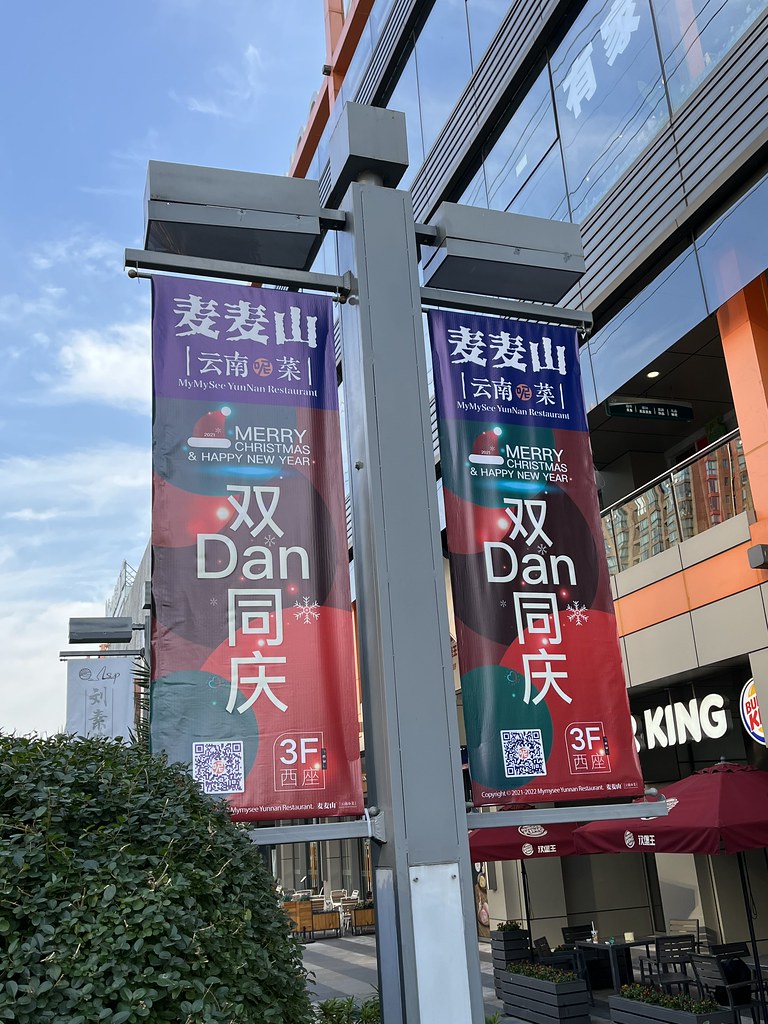
Who is Dan, and what does he have to do with the holidays?? No, it’s actually a reference to two winter holidays.
It reads: 双dan同庆 (shuāng dan tóng qìng)
Hanukkah is 光明节 (Guāngmíng Jié) in Chinese (we wrote a bit about this on ARC), and it’s now over this year. So it’s not about that.
Christmas is now over… that’s 圣诞节 (Shèngdàn Jié). So one “dan” is in 圣诞节 (Shèngdàn Jié). The other is in 元旦 (Yuándàn), the Chinese name for New Year’s Day (which, unlike Christmas, is a national holiday in China).
So “双dan同庆 (shuāng dan tóng qìng)” means “Double dan, celebrated together,” referring to Christmas and January 1st. Try pulling off that compact linguistic wordplay in English!
Here’s something weird, though: the ad above uses pinyin “dan” to represent the two different characters both read “dàn” in pinyin. This ad, however, makes no such effort:

(Don’t be fooled by the stylization of the characters… that’s a 旦 (dàn) character, not 日 (rì).)
So the single character 旦 (dàn) is used to represent both “dan” characters, even though 圣诞节 (Shèngdàn Jié) uses a different “dan.” I’m told this is fairly common, and it’s what you do when you don’t want to insert pinyin into your Chinese text. Maybe that aversion to pinyin in Chinese text is becoming less undesirable over time?
This second ad uses the word 乐享 (lèxiǎng) which is sort of an abbreviated way of saying 快乐享受 (kuàilè xiǎngshòu), or “happily enjoy.” The quotes are there not because a character has been swapped out, but because it’s also part of the Chinese name of FILA: 斐乐 (Fěilè). Not exactly a clever pun.
Happy holidays! Here comes 2022, ready or not…
16
Dec 2021Chinese Christmas Quiz
I’ve been creating some quiz content recently and decided to do one for Christmas. I tried to make it roughly half about basic Christmas vocabulary and half about Christmas culture in China.
One thing that became clear to me while putting together this little quiz is that this culture changes so fast.
Christmas was getting super popular at Shanghai’s kindergartens and elementary schools, with some schools even bringing in a guy dressed up as Santa. But Beijing put the kibosh on that in recent years, opposing such strong “advocacy” for foreign culture in schools. So now, even though Christmas is as popular as ever commercially (there are Christmas trees and decorations all over Shanghai’s many malls), it’s not allowed in schools.
Christmas choir concerts at Christian churches in China were once very popular, even among young people that would typically not go to a church for any kind of religious reason. But as a Christmas activity for fun, to soak in a little extra Christmas ambience, it was popular. But COVID has greatly complicated gatherings in churches, meaning that this year it’s pretty safe to say that all of those performances are canceled.
China remains as dynamic as ever. Christmas is no exception.
So how much do you know about Christmas in China, and Christmas and Chinese? Take this little AllSet Learning quiz and find out…
08
Dec 2021Chinese Christmas Songs: Free MP3s for the Holidays
These are always popular in December, and I can’t believe I forgot to share them last year. Well, they’re back!

Sinosplice still has some awesome familiar Christmas songs in Chinese. This year I’m again posting a selection of the MP3 files online in streamable format, so be sure you’re viewing the original post on Sinosplice.com if you’d like to play the songs without having to download everything.
All right, here we goooo…
Jingle Bells in Chinese
This is version 1 from the album (Mandarin Chinese):
Jingle Bells in Hakka (Hokkien) Dialect
This song is not part of the album because it is NOT Mandarin Chinese. It’s Hakka. (This one is going to have very limited use for most students; it’s just sort of a novelty for most of us.)
Santa Claus is Coming to Town in Chinese
This one is a kids’ version, version 2, also from the album (Mandarin Chinese):
Santa Claus Is Coming to Town (2)
We Wish You a Merry Christmas in Chinese
This song is especially beginner-friendly for learners of Mandarin Chinese (that chorus!):
Silent Night in Chinese
This one is a Christian classic, of course, version 2 from the album (Mandarin Chinese):
Hark! The Herald Angels Sing in Chinese
Another Christian classic, church choir style (Mandarin Chinese):
Download Christmas Songs (zipfile)
If you want to just grab them all, here you go:
The Sinosplice Chinese Christmas Song Album (~40 MB)
+ Lyrics PDFs (1.2 MB)
Disclaimer: I don’t own the rights to these songs, but no one has minded this form of digital distribution (in the name of education) since 2006, so… Merry Christmas?
MP3 Track Listing
- Jingle Bells
- We Wish You a Merry Christmas
- Santa Claus Is Coming to Town
- Silent Night
- The First Noel
- Hark! The Herald Angels Sing
- What Child Is This
- Joy to the World
- It Came Upon a Midnight Clear
- Jingle Bells
- Santa Claus Is Coming to Town
- Silent Night
- Joy to the World
Merry Christmas everybody… 圣诞快乐!
While we’re on the subject of Christmas and Chinese, AllSet Learning (my company) is doing some special offers with our live, 1-on-1 online Chinese classes. 3 lessons (one hour each) is a great quantity to try it out or gift to a loved one, and we have larger packages for the more ambitious learners as well.

01
Dec 2021A Shiny Pun
A pun in a jewelry ad:
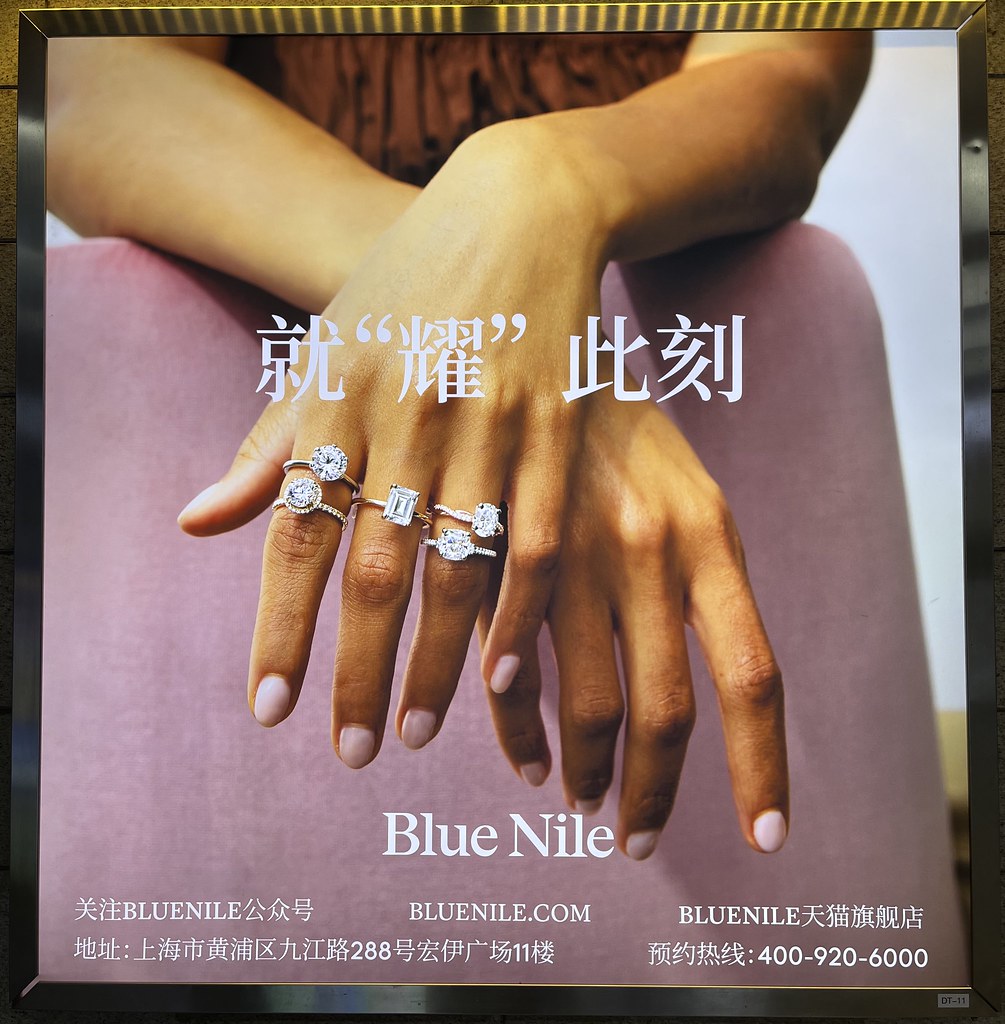
Here’s the text:
就“耀”此刻
It’s a very simple pun, although the words and characters involved are somewhat advanced.
“耀,” as in 闪耀, meaning “to glitter” (or even 炫耀, meaning “to flaunt”), is a substitute for 要, meaning “want.” 此刻 is a formal way of saying “this moment.”
26
Nov 2021The MVT for Thanksgiving
Back when I was teaching at Zhejiang University City College in Hangzhou (2001-ish?), I taught a course called American Society and Culture. I also had to introduce Thanksgiving. My students were especially interested in the food, so I found myself with an interesting task: coming up with a core set of dishes for an American Thanksgiving dinner.
Put another way; what is your Minimum Viable Thanksgiving? I mean, sure, you could get all sentimental and sappy and talk about your family and loved ones, but this post is about FOOD! Focus, please.
The list I came up with included these 5 must-haves:
- Turkey
- Stuffing
- Mashed potatoes
- Cranberries (in some form)
- Pumpkin pie
Then I’d make corn, green beans, and pecan pie runners-up, maybe.
Here’s an interesting fact: if you’re like me and eat out for Thanksgiving in China, even in Shanghai in 2021, it’s kind of hard to find a restaurant that will include all 5 of these items on their Thanksgiving menu. It seems like they always omit one of those core items. (This year it was pumpkin pie that my restaurant of choice left out, but fortunately I got some from another source.)
Anyway, this did get me wondering how many Americans would agree with my list. What would you sub in/out from the list of 5 MVT items? (Sound off in the comments!)
And, because my life is all about Chinese learning resources, here are some images with Chinese:

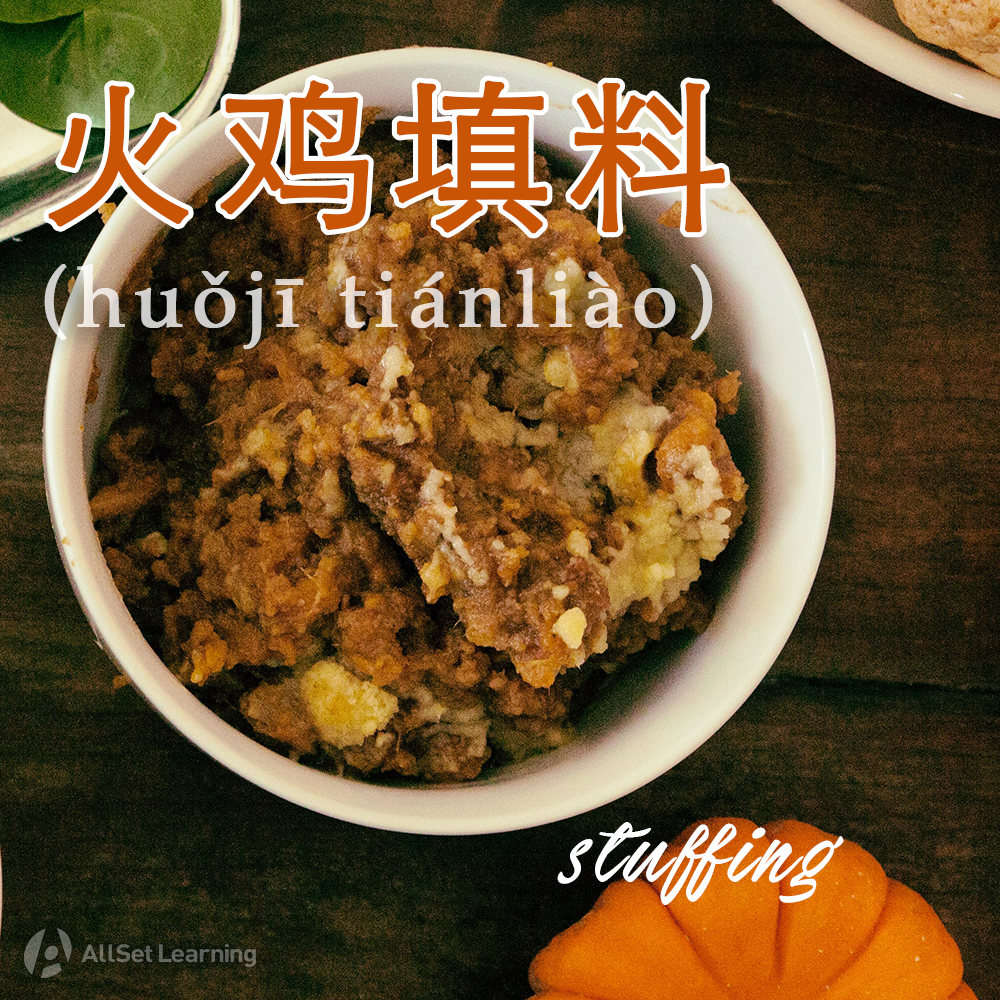
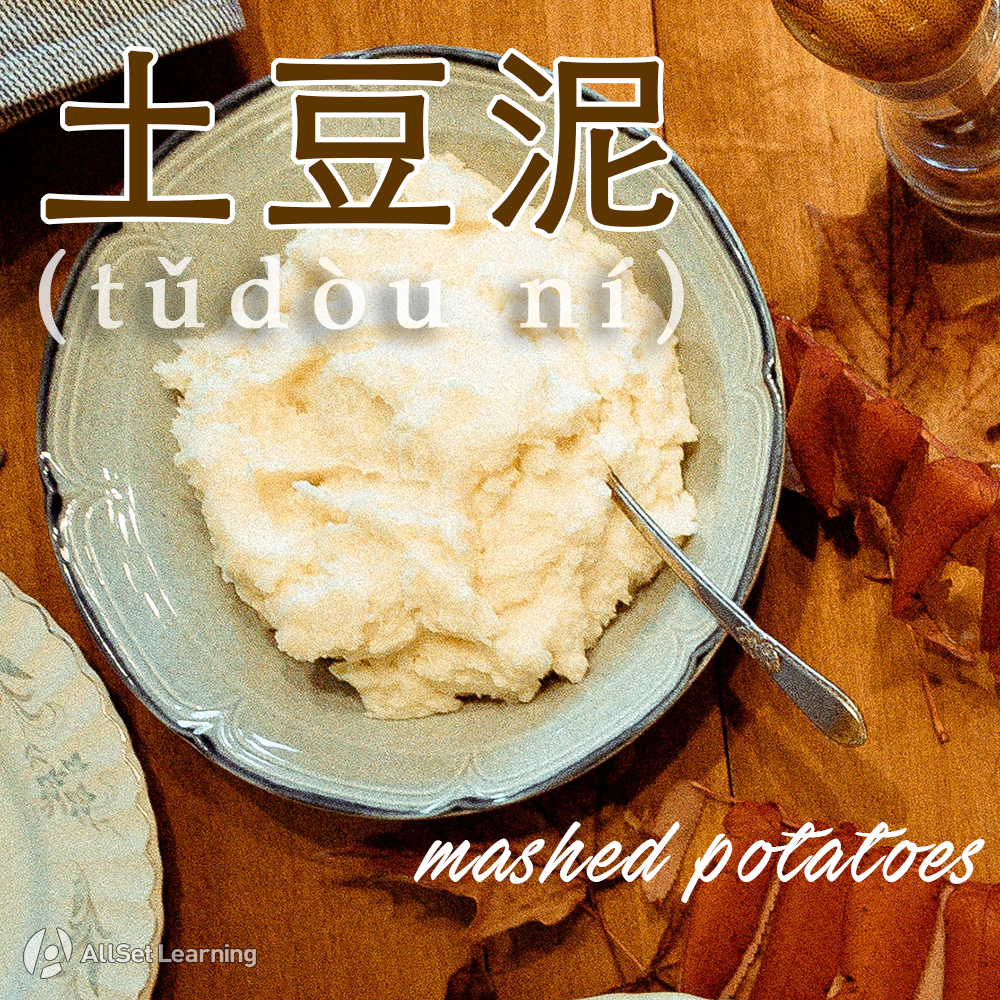
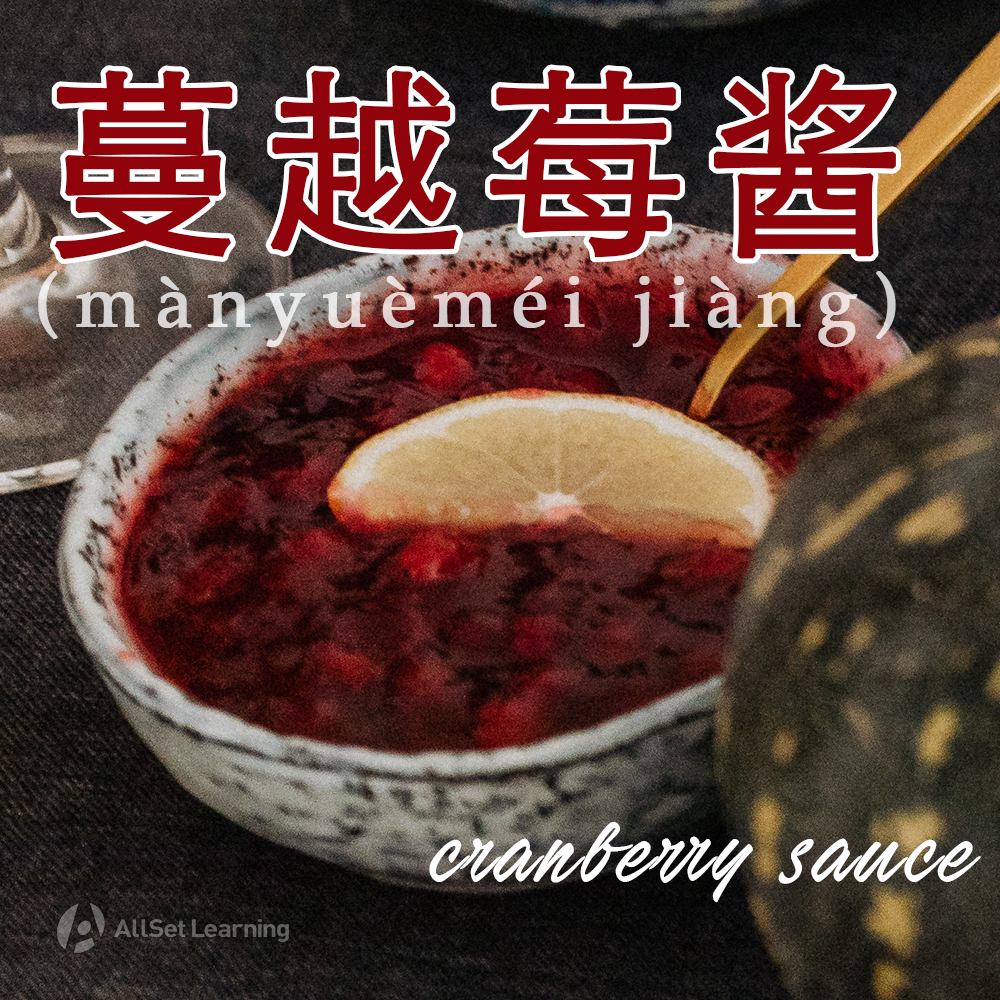
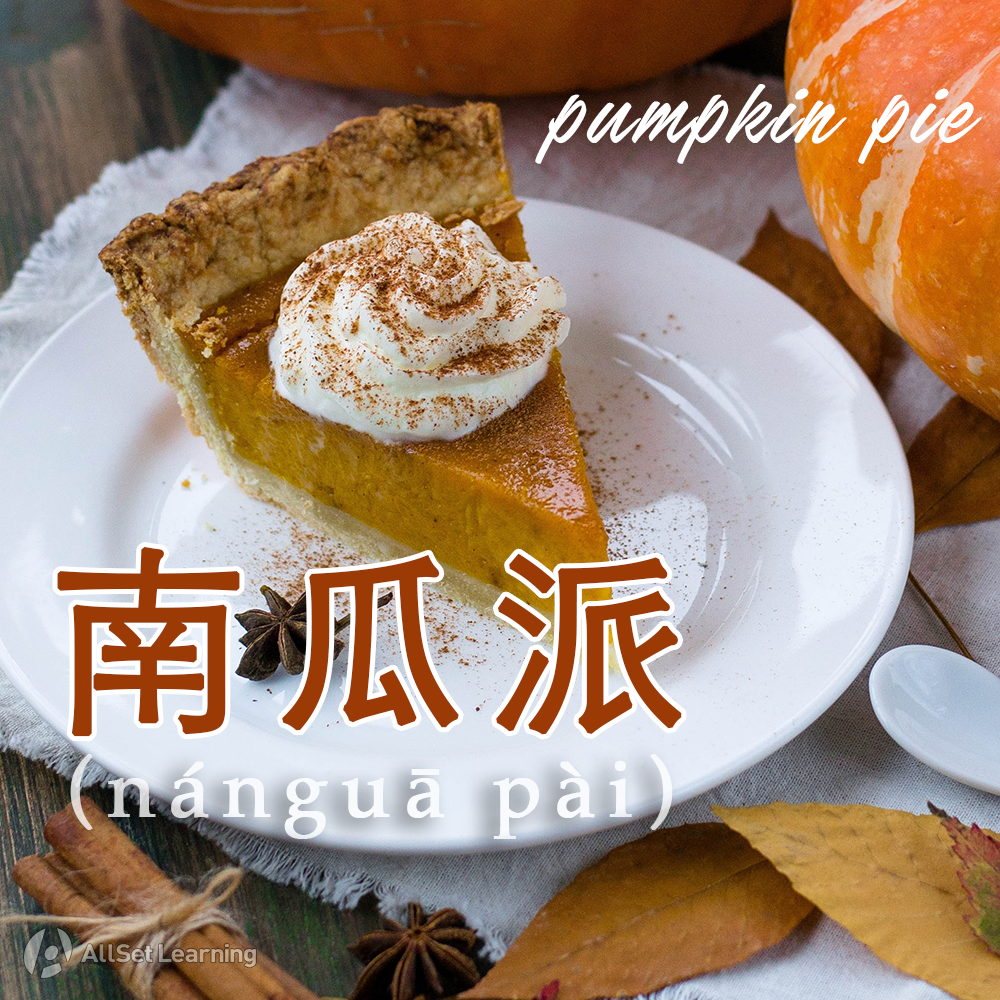
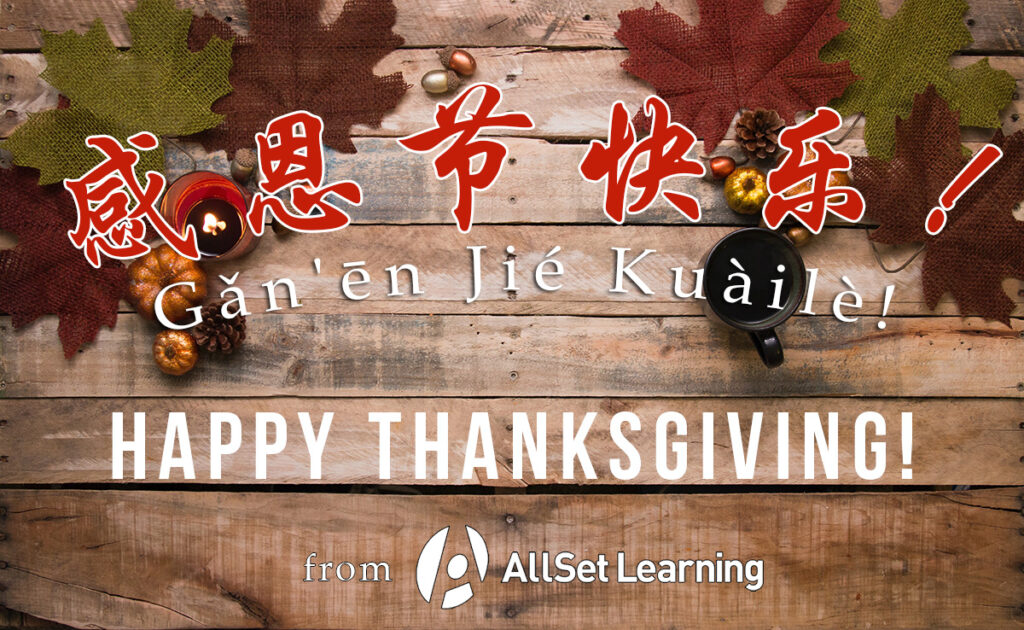
17
Nov 2021Card Games for Language Learning
It was last year that I bought the card games Language Guardians 3 and Fighting Flashcards. It wasn’t until last week that I put together a group of people to test them out. It was a good time!
Thanks to Akeel for help organizing, and to Vaughn and David for joining in. Here’s our group in the AllSet Learning office lobby:
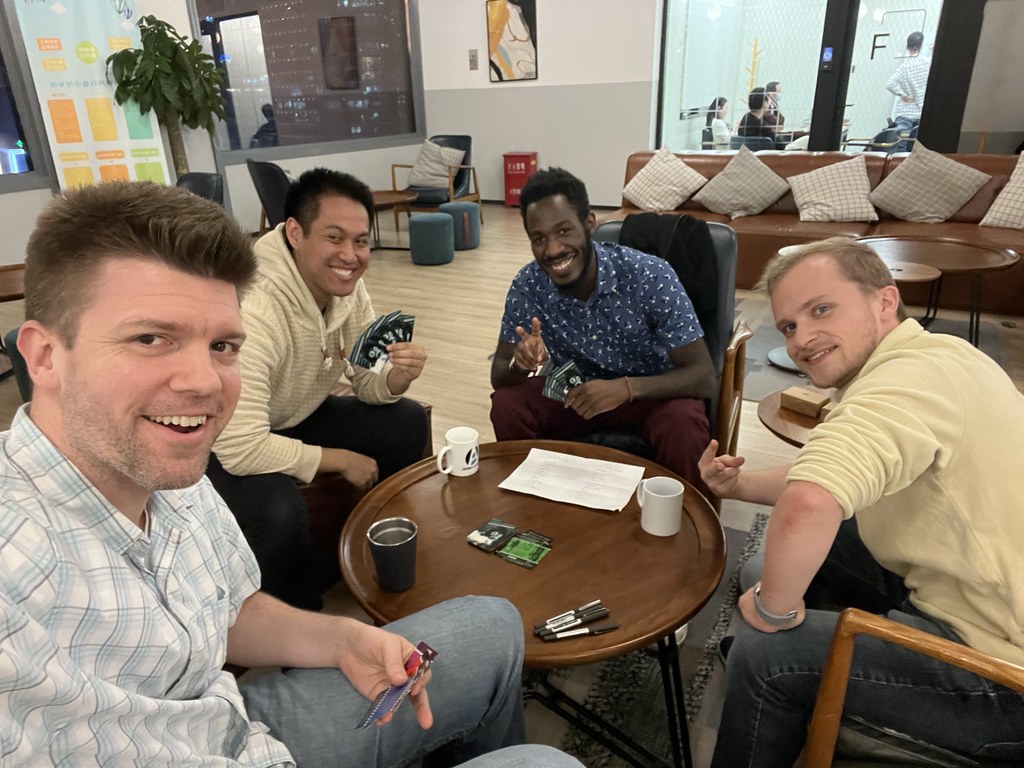
Game 1: Language Guardians
This game is sort of like Uno in that you have a number of colors (which correspond to language tasks) and a number of card types (which correspond to word categories). If you know Uno, this game is super easy to pick up.
I should note that the number is actually quite important, in that “Language Guardians 1” is meant for elementary-level players, whereas “Language Guardians 3” is much more advanced. We used a little “equivalency chart” so that we could mix the categories of 1 and 3, and different level players could all enjoy the same game.
So, for example, when the LG3 “monsters” card came up, an elementary-level player could sub in the LG1 category “animals.” It worked just fine. There was lots of learning from each other. Good times!
Game 2: Fighting Flashcards
This is the game I was most excited to try out because it plays kind of like Magic: the Gathering, except that each player has his own stack of flashcards to work through. When you’ve worked through your flashcard deck, you win!
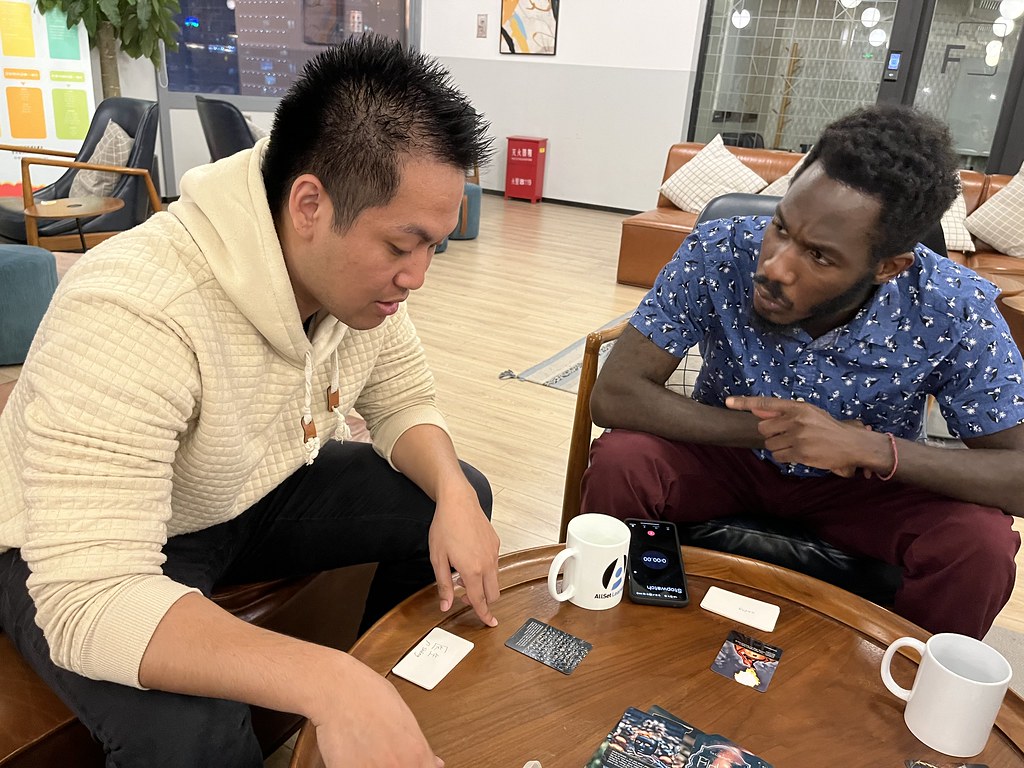
At this point, we were running short on time. So for this one, I played “game master” in order to keep the game moving smoothly.
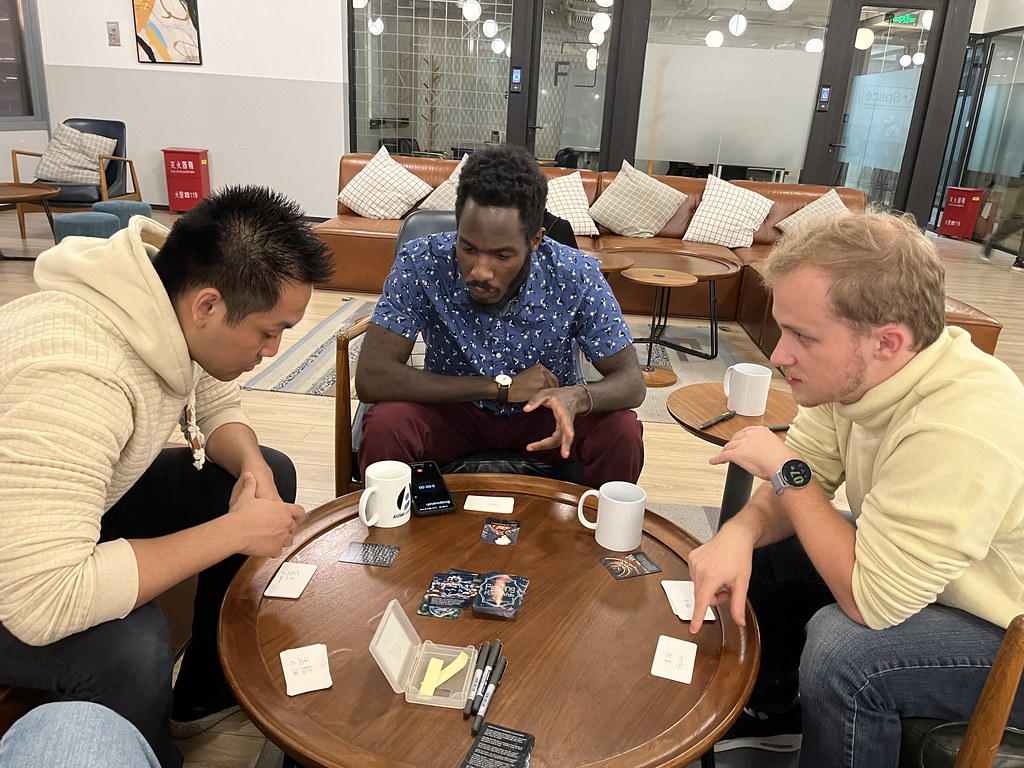
It was our first time playing the game, so we were still getting the feel for it, but the interplay between the game cards and the flashcards was super interesting. Over the course of the game, it became quite apparent how powerful some game cards were, and that you could adjust the “balance of power” between game cards and flashcards by omitting certain game cards from the deck.
Flashcard Considerations
The cool thing about Fighting Flashcards is that each player uses his own deck of cards. So by bringing the cards you’re working on, you customize the game to your own level, and players of different levels playing together is no problem. Pretty slick.
BUT, what if one player brings flashcards he already knows 90% of, and some other player ambitiously brings flashcards he only knows 40% of? Obviously, it’s not going to be a super fair match-up.
To compensate for this, I told the players they didn’t need to provide their own flashcards. I provided blank flashcards which we would use to make new flashcards right before the game started.

I provided some HSK word lists and AllSet Learning themed word lists, and each player was able to select a source of vocabulary which was both level-appropriate and interesting to him personally. Then, another player would choose words from a player’s list, providing some randomness and potential challenge. After quickly making 20 flashcards for each player, everyone had about 5 minutes to quickly review his own words before kicking off the game.
Igniting Imagination
As an educator and gamer, the part I loved most about this exercise was the way it ignites your imagination. The game instructions themselves encourage you to try different variations, use only certain cards for certain game types, etc. But just playing the games results in all kinds of ideas for twists on the games, ways to practice different language skills, ways to use flashcards, and so on.
One of the ideas we had when playing Fighting Flashcards was for each player to use his own phone to do electronic flashcards. But the game itself requires paper flashcards because it has multiple cards requiring you to shuffle your deck, or go through the flashcard discard pile, etc. So that didn’t work, but it’s not hard to imagine a variation of the game which would work with electronic flashcards (or maybe even a new flashcard app that supports games like this?).
Sure, anyone could create their own language learning games with pen and paper, but having these fully realized games in front of you really sets the stage so for quickly building on what’s already there with new ideas.
More Info on the Games
Full Disclosure: I got in touch with Matthew at LanguageCardGames.com before buying the card games, but I did buy them, and I don’t earn any kind of affiliate income from the links in this article. If you’re intrigued and have the means to do so, please support Matt and LanguageCardGames.com!
Also, since I didn’t go into gameplay much in this article, if you’re interested in learning more about how the games work, then definitely check out the website. Matthew has multiple gameplay videos on YouTube showing different games in action, and with different languages too.
12
Nov 2021Easy-to-Read Signs around Shanghai
I was recently walking around Shanghai near the Bund (west side of the river), and realized that a lot of the sign names there are super beginner-friendly. This is actually kind of rare, so it’s worth pointing out.
Here’s one for you, beginners!


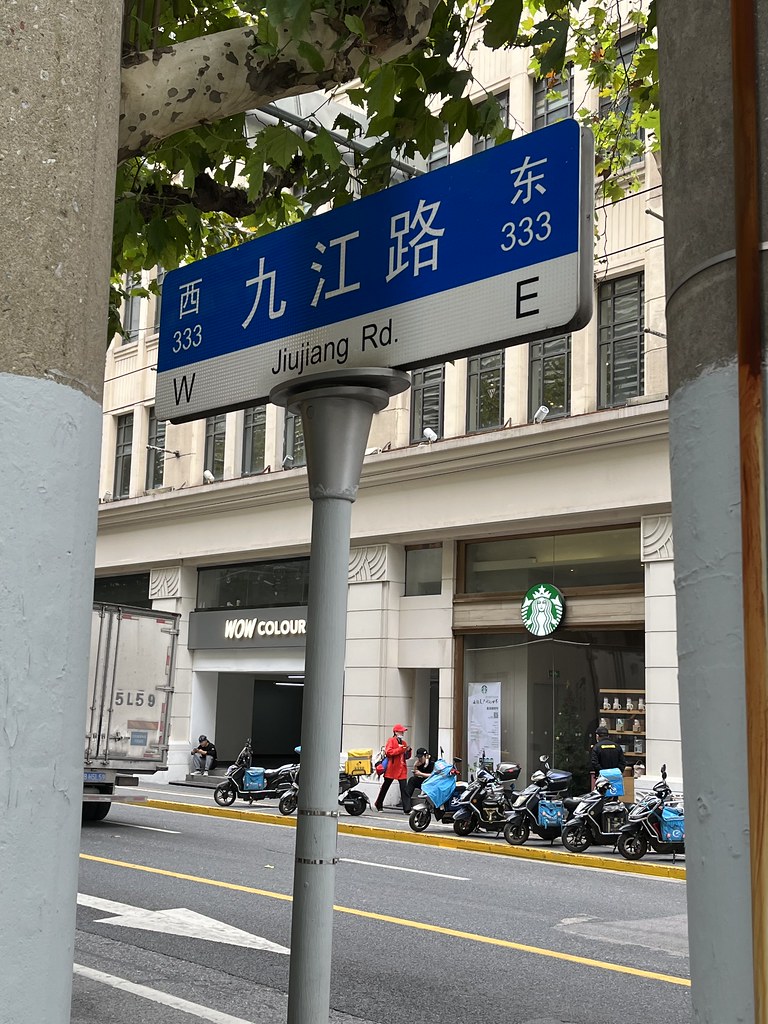

A few notes:
- Having the cardinal directions (东、南、西、北) on the street signs is actually super useful. I use this constantly while walking around, and it’s actually pretty hard to get lost (even what your phone is dead!).
- I didn’t realize this when I first came to China, but a ton of street names in many cities are just names of other cities in China. So you might assume for a long time that a street name like 九江路 is some kind of poetic “nine rivers street” made up for Shanghai, but no. You’d be wrong. Jiujiang is a city name.
04
Nov 2021English Randomness from Shanghai
A t-shirt on the light rail escalator:

A soup shop sign. The part I love (because it’s hilarious), reads, “Soup is the new coffee.”

Ear cleaning (yes, it’s a thing, considered more like a massage than a… dental checkup or something else unpleasant):
